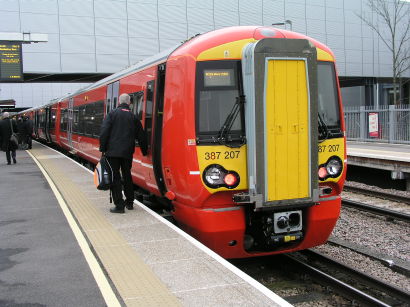NEW figures showing how many trains run past intermediate stations to recover lost time suggest that more than 5,000 services are affected by 'stop-skipping' every month.
The Department for Transport has ‘regretted' the inconvenience, but claims fewer than 1 per cent of stops are ignored during an average day.
A Freedom of Information request by the BBC has revealed the statistics, prompting protests on behalf of passengers who cannot join or alight from trains because they are now running 'fast'. Reports also suggest that in some cases passengers have been carried past their stops because no warning was given in advance.
The official figures cover the 10 months from April 2017 to February 2018, and reveal that more than 52,000 trains were affected by 'stop-skipping' in that period.
The worst operator was named as Govia Thameslink Railway, with more than one in 70 services allegedly missing out some stops to recover lost time. However, GTR is also the largest passenger franchise in Britain, covering Southern, Thameslink, Great Northern and Gatwick Express.
A GTR spokesman said missing station stops was a "last resort when a train running late would otherwise prolong disruption". He added: "We operate the country's most congested rail network and with a train departing every 27 seconds on average, even a minor delay to one train can cause a widespread and long-lasting knock-on effect to many other services and passengers across many routes."
The league table of stop-skippers places Southern, part of GTR, at the top of the list, followed by South Western Railway (one in 90), Southeastern (one in 100), and then Transport for London Rail and Arriva Trains Wales (both one in 142).
Less congested or complicated routes recorded significantly fewer missed stops. Greater Anglia services only stop-skipped once in 500 times, while Chiltern Railways, Virgin Trains East Coast and Heathrow Express scored better than one in 1,000. Heathrow Express has no intermediate stops, except those serving various terminals at the airport itself.
The Office of Rail and Road says the majority of delays, about 60 per cent, are caused by infrastructure problems or third parties, such as trespassers.
The other 40 per cent are caused by operators. About three-quarters of these (30 per cent), are attributed to the operator of the delayed train, while the rest, equivalent to 10 per cent of all delays, are attributed to another operator, as when a slow-running freight train delays passenger services.
The Department for Transport said: “Our railways are more intensively used today than at any time in our history. Fewer than 1 per cent of stops are skipped per day. While any inconvenience caused by stop-skipping to passengers is regrettable it helps restore the timetable, benefiting many more people across the wider network.”
The head of customer experience at the Rail Delivery Group, Jacqueline Starr, agreed that it was 'frustrating' for passengers when stops were skipped. She added: "While the number of incidents causing delays and cancellations is going down, each incident is having a bigger impact due to congestion on the network and this is something that we are working hard together to get right."


